The incident of a candidate using artificial intelligence (AI) to cheat in the 2025 High School Graduation Exam marks a new and challenging turning point in exam management.
Synchronize policy and technology
Dr. Nguyen Minh Giam - Faculty of Pedagogy, Thu Dau Mot University (HCMC) said that the incident of candidates using AI to cheat in the High School Graduation Exam is a warning bell about how we are managing exams in the digital age. This incident clearly shows that technology changes the way students learn, take exams, and think.
To respond, the education sector needs to update policies and techniques synchronously. First of all, add clear regulations on the use of technology in learning and exams; at the same time, strengthen modern monitoring equipment and software in exams.
However, it is more important to educate students about digital ethics and personal responsibility, and to be safe when using AI. It is only a tool to support learning, not a means to cheat. Without equipping students with digital skills and a sense of academic integrity early on, no matter how carefully controlled, cheating can still occur in more sophisticated forms.
In addition, it is necessary to gradually innovate the way exams are organized, reducing the pressure on a single exam/session. Assessment forms such as projects, group assignments, or individual learning products should be expanded, helping students demonstrate their real abilities and limiting the motivation to cheat.
This is the assessment of the entire learning process of students with the combination of family - school - periodic assessment management platforms of the Department of Education and Training and is continuously updated to the management and assessment system of the Ministry of Education and Training .
According to Associate Professor Dr. Tran Thanh Nam - Vice Principal of the University of Education ( Hanoi National University), to respond to cheating in exams using AI and prepare for the new education system, there needs to be a synchronous solution on 3 pillars: Education, technology and regulations.
Specifically, building learning to master, real learning to build a sustainable career, instead of learning to take exams, taking exams to pass. Improving technology and AI capacity for learners, emphasizing technology ethics; educating and fostering lifelong learning skills and critical thinking. Regarding technology, applying AI to monitor behavior in the exam room; developing digital exam platforms with strict control over data access.
Regarding regulations, it is necessary to update regulations on high-tech cheating. In particular, change the structure of the exam, from assessing memory and understanding to assessing analysis, critical thinking and creativity; change the answers, from only right and wrong to creativity, unique critical perspectives... At the same time, deploy a flexible and diverse assessment system based on the process with information from digital transcripts, project assignments, peer feedback...
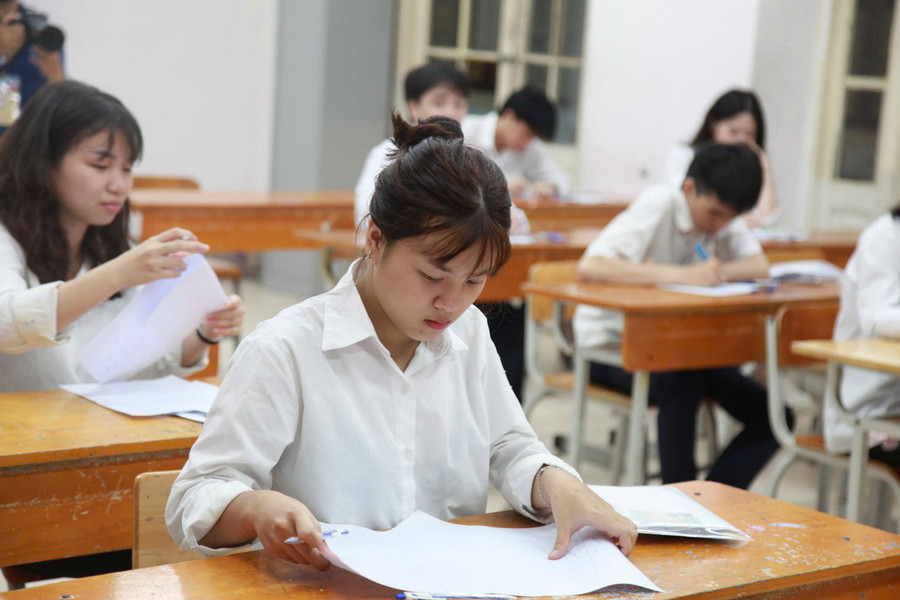
According to Dr. Ngo Thi Hoang Van, Faculty of Biology - Agriculture - Environment, University of Education, Danang University, to respond to fraudulent behavior using AI, we need to act in two parallel directions:
First, urgent solutions to protect the fairness and integrity of exams. It is necessary to upgrade the security system with AI technology: from detecting smart devices, preventing abnormal signals, to analyzing behavior in the exam room.
At the same time, we need to build a clear legal framework, clearly define responsibilities, and impose specific sanctions on high-tech fraud. However, techniques and discipline alone are not enough. More importantly, we need to educate students about academic ethics, emphasizing that: "Study is to become a human being", not just to cope with exams.
Second, long-term reforms aimed at redesigning assessment and development of learners’ competencies. Instead of relying on traditional standardized tests that are easily “overtaken” by AI, we need to promote formative assessment, assessment through practical products, learning projects and problem-solving skills.
At the same time, AI needs to be included in educational programs as an active learning tool, helping students develop critical thinking, digital skills, and the ability to assess the reliability of information - vital skills in the digital age.

New requirements for assessing learner competence
“The phenomenon of using AI to cheat in the High School Graduation Exam not only raises the issue of exam management, but also makes me think more deeply about how we are assessing learners' abilities in the AI era,” sharing this, Dr. Ngo Thi Hoang Van said that, in the current context, the High School Graduation Exam still plays an important role and performs well the screening function, ensuring the general knowledge level, and at the same time serving as the basis for university admissions.
However, in the context of strong technological development and AI becoming more and more popular, relying only on the results of a single exam to comprehensively assess learners will gradually become insufficient. Because, AI can now support users in writing, solving math problems, programming, and even simulating human-like writing style. This makes the assessment based on the final product (paperwork, answers) increasingly vulnerable to being replaced if there is a lack of monitoring factors and reflection of the actual learning process.
From there, according to Dr. Ngo Thi Hoang Van, it is necessary to shift the focus of assessment from "product" to "process" - meaning not only caring about what students make, but also how they do it, how they think, how they argue, and how much they can apply it.
Forms such as learning assessment, project work, presentations, group collaboration, multi-dimensional criticism... will become more practical and difficult to "swap". In addition, AI should not be considered a competitor in assessment, but should be seen as a tool to support teachers and learners.
“What we need is to develop assessment methods where AI cannot replace human thinking, moral values and creativity. In other words, assessment in the AI era must shift from “testing memory” to “provoking thinking, assessing action capacity and maturity”. These are things that no matter how advanced AI is, humans still need to develop; to not only live with AI, but also live with courage and dignity in a world that is changing every day”, Dr. Ngo Thi Hoang Van shared.
Sharing the same view, Dr. Nguyen Minh Giam said that in the AI era, the important thing is not how much students remember, but whether they understand the nature, know how to debate, be creative and solve problems. Assessment must therefore focus on the process, not just the results. Therefore, it is necessary to shift to comprehensive capacity assessment, combining the learning process and actual products.
There must be a system of assessing the learning process of learners from the Ministry of Education and Training through the Departments of Education and Training to schools connected via the Internet. When learners are properly assessed, they will have the motivation to truly learn, truly live, truly mature.
“AI is not a threat, but should be seen as a strategic opportunity to restructure the education system, build a learner-centered education, develop in a personalized direction, ensure fairness, promote creativity and be ready to deeply integrate with the digital world,” said Dr. Nguyen Minh Giam.
“We need to envision and build a new education, where artificial intelligence does not replace but accompanies human intelligence; where students do not passively absorb but are proactively creative; where assessment does not only measure knowledge but also reflects ethics, skills and adaptability.
The AI cheating incident is not just an incident, it is a warning that we need to innovate faster, stronger and more comprehensively. Fighting cheating is necessary, but more importantly, we need to redefine the goal of education: Not just getting high scores, but becoming a kind, self-reliant and responsible person in the AI era. - Dr. Ngo Thi Hoang Van
Source: https://giaoducthoidai.vn/quan-ly-thi-cu-trong-ky-nguyen-so-ba-tru-cot-hoa-giai-thach-thuc-post738198.html






![[Photo] Prime Minister Pham Minh Chinh chairs meeting to deploy overcoming consequences of storm No. 10](https://vphoto.vietnam.vn/thumb/1200x675/vietnam/resource/IMAGE/2025/10/3/544f420dcc844463898fcbef46247d16)
![[Photo] Students of Binh Minh Primary School enjoy the full moon festival, receiving the joys of childhood](https://vphoto.vietnam.vn/thumb/1200x675/vietnam/resource/IMAGE/2025/10/3/8cf8abef22fe4471be400a818912cb85)
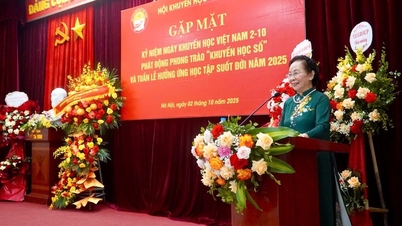















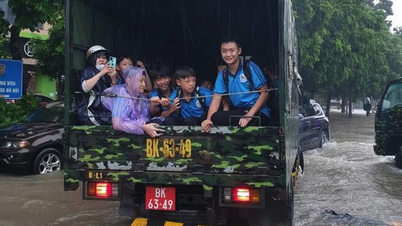
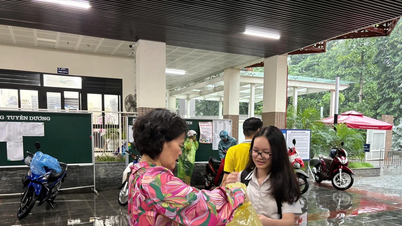








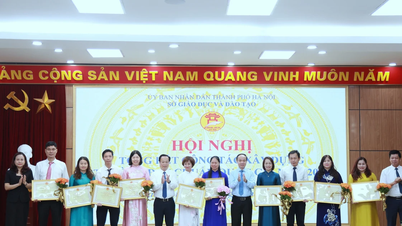

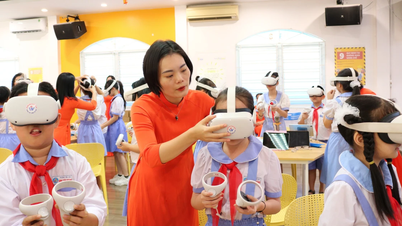
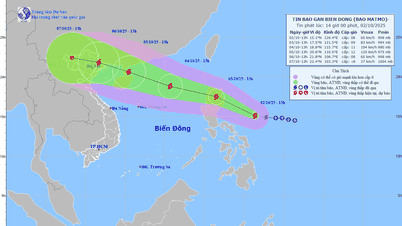




































































Comment (0)